August 6, 2020
Law Enforcement Accountability Task Force
To the members of the Law Enforcement Accountability Task Force, my name is Javonne Rich and I am the policy advocate of the American Civil Liberties Union of Delaware. As the nation’s oldest defender of civil liberties, the ACLU has fought for constitutional policing that ensures peoples’ rights are protected and maintains public safety throughout our 100-year history.
The high-profile killings of George Floyd and Breonna Taylor and the protests that ensued have highlighted longstanding policing issues in our own state. There has been renewed scrutiny of law enforcement officers and agencies--and rightfully so. Police institutions have much power to deprive people of their liberties and their life. The Law Enforcement Accountability Task Force should prioritize policies that foster fairness, transparency and accountability. Policies that enhance public trust include:
- Collecting and Making Police Data Public: Too little information about police departments and officers is made public. Fully transparent practices and outcomes improve decision-making, allow the public to hold the legislators and police accountable, and enable the public to push for change in the future. Criminal justice agencies must commit to tracking and publishing details and statistics about police misconduct, arrests, stops and use of force, including disparities that these activities may produce. Police departments should also make policy manuals and personnel information public.
- Revising the Standards and Practices for Use of Force: Delaware’s use of force standards allow law enforcement officers to use deadly force when they have a subjective fear for their lives or the safety of others. Unfortunately, this standard makes it nearly impossible for officers to be held accountable when they use unnecessary force. Most other states have raised the threshold for when officers may lawfully use deadly force, ensuring that it must be reasonably and responsibly used. In addition, state and national leaders have sought to rescind qualified immunity, so that officers can be held accountable when they engage in unconstitutional use of force.
- Implementing Body-worn Cameras: Video footage captured during officer-community interactions can help support or dismiss accounts conveyed by police officers and community residents. Body-worn cameras can lead to faster resolution of complaints that allege excessive use of force and other police misconduct. Body-worn cameras should be implemented and require to be turned on during all police and community interactions. That footage should be subject to publication.
- Establishing Independent Review Boards: Many community members believe that police departments do a poor job of holding police officers accountable when misconduct occurs. There is a need to (1) hold police officers accountable for unjustified use of deadly force against community members, and (2) hold police officers accountable for the routine violations and grievances that go unresolved and result in resentment from community members. Civilian review boards should have subpoena, discipline and policy review authority.
- Revising the Law Enforcement Officers’ Bill of Rights (LEOBOR): Many of the aforementioned changes are not possible without significant revisions to LEOBOR to make police disciplinary records and use of force reports public record.
Law enforcement agencies also stand to increase trust with community members by rethinking invasive and aggressive policing tactics that primarily impact communities of color by:
- Discontinuing Safe Streets and the Governor’s Task Force: The Operation Safe Streets and the Governor's Task Force (OSS/GTF) allows police officers and probation officers to jointly police those on probation, and by extension their family and communities. This aggressive policing program has eroded trust within communities and has led to black and brown communities being overpoliced.
- Discontinuing Civil Asset Forfeiture: Delaware’s forfeiture laws allow for police to seize property unless an owner can prove that the evidence is not forfeitable. Thus, the burden of proof is on the property owners to demonstrate that their property being seized has nothing to do with illegal activity. Moreover, law enforcement is incentivized to seize property because it creates revenue for the Special Law Enforcement Assistance Fund, which they are not obligated to publicly account for.
Police officers must be fair, transparent and accountable. Otherwise communities will not view police officers as a legitimate authority, making it less likely they will assist police agencies in solving violent crimes, which makes us all less safe. Without transparency, the public may remain suspicious that officers are not held accountable for their actions. Similarly, a transparent process can also help to demonstrate when officers acted appropriately.
Beyond these recommendations, the ACLU of Delaware welcomes partnership with the Law Enforcement Accountability Task Force to address other reforms that would better serve residents and restore faith in law enforcement. Thank you for your time and consideration of these issues. Please let me know if you have any questions.
Thank you,

Javonne Rich
Policy Advocate
ACLU of Delaware
[email protected]


